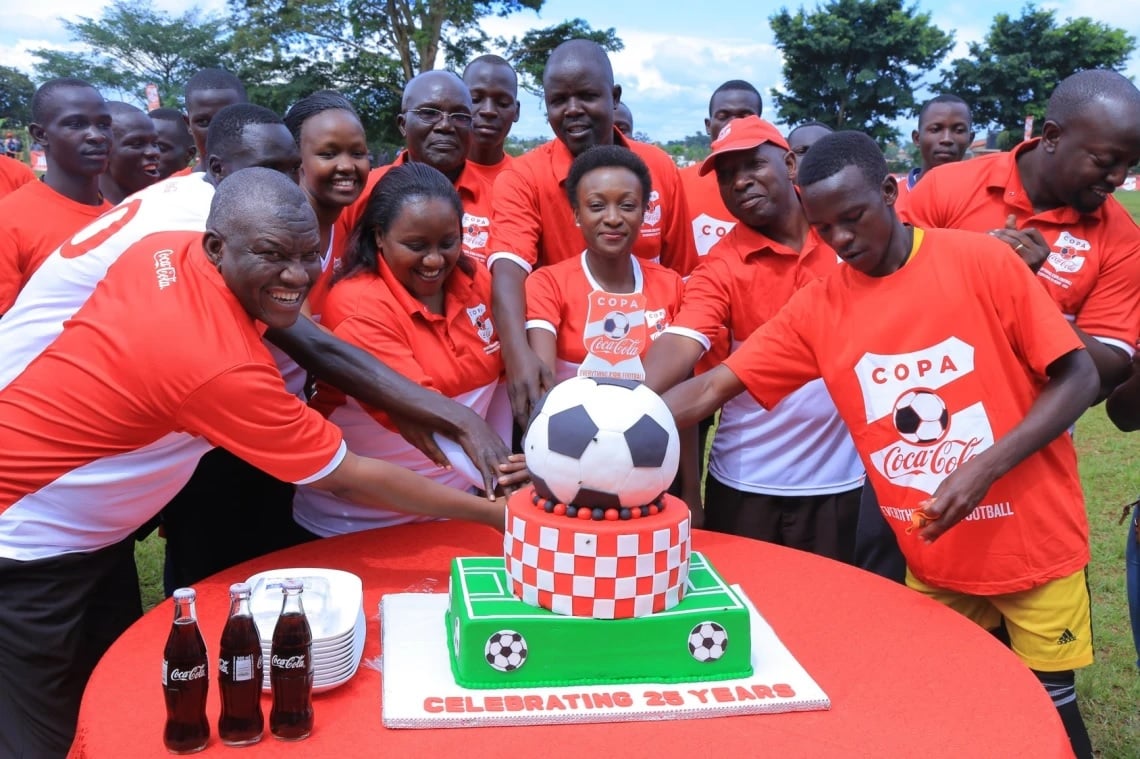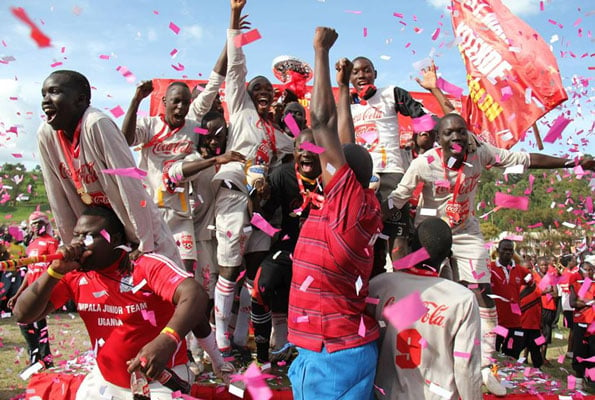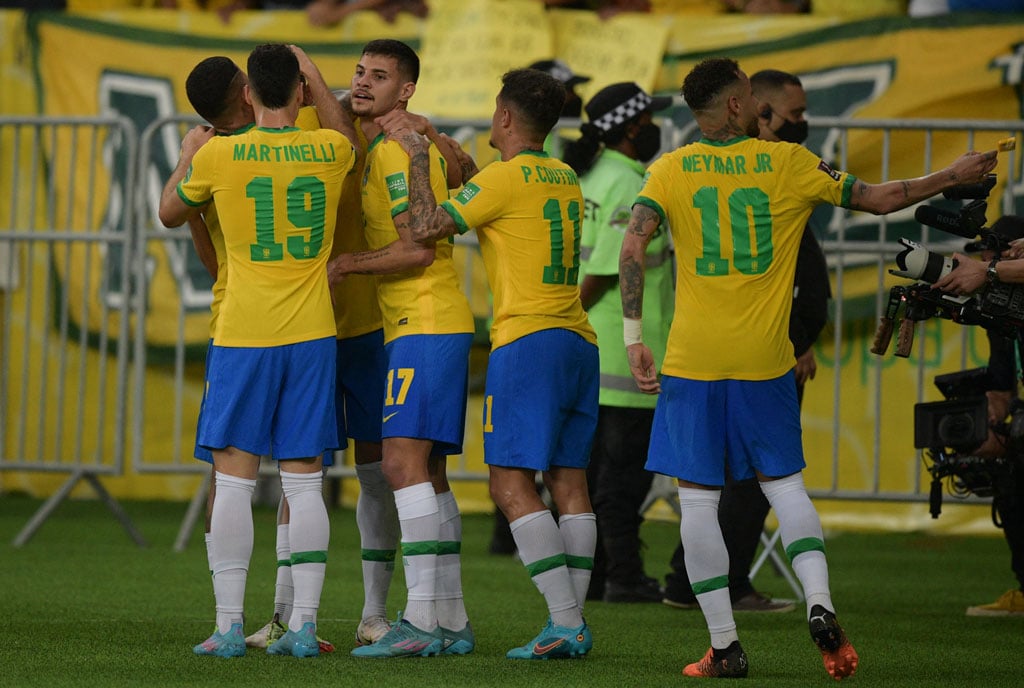Prime
No more Coke to quench the thirst in school football

Last good day. Coca-Cola and schools officials celebrate 25 years of the sponsorship in 2019 at Jinja SSS in Jinja City. PHOTOS/GEORGE KATONGOLE
What you need to know:
Divorce. For nearly 30 years, Coca Cola have been the headliners of the post-primary football tournament, quenching the thirst of the game with millions of shillings in sponsorship annually, that has groomed so many talents in the country but that changed this year. George Katongole explores what happened.
Copa Coca-Cola has been the heartbeat of school football. In fact, it is rightly referred to as the ‘Schools World Cup’. Yet for the first time in almost three decades, the premier schools competition will be held under a new name – the USSSA Boys Football.
Coca-Cola’s sponsorship was the longest sports contract in Uganda.
The Uganda Secondary Schools Sports Association (USSSA) is yet to announce a new sponsor for the boys’ tournament that will be held in Arua, although the girls’ tournament will be held under the banner of Fresh Dairy.
“It is going to be a tough test for the organisers in Arua. But I hope USSSA have learned a lot from the high standards we have been used to for the past 20 years,” Nimrod Kintu, head coach of Amus College in Bukedea, says.
‘Pay to play’
Organisers of what came to be called as Copa Coca-Cola Schools Championship have been offering schools perks, including meals, soft drinks and uniforms (for teams that reach the quarterfinals).
All teams needed was transport to the venue as Coca-Cola’s sponsorship catered for the rest. Yet for now the tournament will become more expensive.
Copa has been a big tournament for obvious reasons. It has been held in more than 60 countries attracting more than one million participants annually.
What started in Zimbabwe in 1988 was formalised under Copa Coca-Cola in 1998, when it was first launched in Mexico. The aim of Copa Coca-Cola is to create the world’s largest and most inclusive football grassroots programme.
With the approach now towards ‘pay to play’, some schools could be in a fix.
To subscribe to the USSSA tournament, a school contributes Shs38,000 for each player per day for the duration of the tournament. To field 18 players for 14 days, a school now needs Shs9.5 for subscription.
“The tournament will obviously become expensive for many teams,” Yusuf Kasirye, head teacher of Namagabi SS Kayunga, said in a recent interaction.
Building the wall
Patrick Okanya, president of the USSSA, says they hope to have nailed down a sponsorship by the time the tournament kicks off next month.
The schools’ football fiesta started in 1986 as the UTV Cup and was held in Kampala for seven years until it became a national competition in 1993. For the next three years, the tournament would be called the National Post-Primaries until the famous 1996 tournament in Masaka when Coca-Cola fully funded the competition.
“Coca-Cola’s involvement opened many windows of opportunity,” says Kennedy Mutenyo, the former promotions manager of soft drink company.
For 26 years, Mutenyo was the face of Coca-Cola at the schools championship.
“It became a universal tournament with fairness at the forefront,” he says, explaining that before 1999, the organising committee used to invite teams that had not qualified.
“We made sure that the only way to participate was for you to win in your district,” Mutenyo said.
The tournament was one of the most highly rated youth competitions in Uganda, which started competitive regional tournaments in 2014.
“Through Copa, we built a critical mass and local clubs such as KCCA and Vipers started believing in young players,” Mutenyo said.
Before 1993, repeaters were a common problem in the tournament.
David Katende Ssemakula, the assistant general secretary of the National Council of Sports (NCS), has always been critical of schools that instead turn their school teams into football clubs.
“Repeating a class is not a crime. But instead of students playing football, some had become footballers in the schools. They were repeaters on the pitch. It used to undermine young players,” he said.
When repeaters were eroded, private schools took the championship seriously and started offering sports bursaries.

With Coke gone, Fresh Dairy has made some inroads and is already sponsoring the girls tournament.
In part, the current crop of young players began their journey into football. Mike ‘Sulaiman’ Mutyaba, for instance, was used by Standard High Zzana as a 15-year-old in 1996, something unheard of before. Later, others such as Allan Okello, Julius Poloto were spotted.
Apart from building a talent pool that would be used for national teams, Copa Coca-Cola platform has also trained referees. The organisers insist on Fufa sending upcoming referees and most have risen to the top after the tournaments.
Rule of law
If there is anything that made the tournament tick, it was the uncompromising leadership under Raphael Bwire Ouma, former Old Kampala SS head teacher.
Copa is reputed for fair application of the rules and equality before the rules. But even then, they struggled to put an end to the use of non-bona fide players.
Previously, Mutenyo suggested the use of photos on examination slips could help solve the challenge yet up to now many schools go ahead to forge result slips for students.
But Mutenyo hints that not all members of the executive committee were committed to combating mercenaries.
“The country pays heavily because you are training people how to become corrupt. Corruption starts in schools. Students are taught how to get away with fraud by altering names, age or impersonating other students,” he says.
Winners since
1986
2019 Kitende
2018 Buddo SS
2017 Jinja SS
2016 Kibuli SS
2015 Kitende
2014 Kibuli SS
2013 Kitende
2012 Kitende
2011 Kitende
2010 Nankyama
2009 Buddo S.S
2008 Kitende
2007 Kitende
2006 Kitende
2005 Kibuli S.S
2004 Kitende
2003 Old Kampala
2002 Nagalama
2001 Ngabo Acad
2000 Kibuli
1999 Old Kampala
1998 Kibuli
1997 St Leo’s
1996 Kibuli
1995 Kibuli
1994 Lubiri SS
1993 Kibuli SS
1992 Kibuli SS
1991 Kibuli SS
1990 Kololo SS
1989 Kibuli SS
1988 Kololo SS
1987 Kololo SS
1986 Kololo SS
[email protected]




